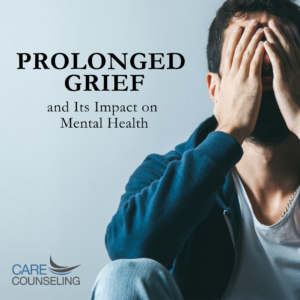Prolonged Grief and Its Impact on Mental Health
 Grief is a natural response to the loss of a loved one, and it can take many forms. However, for some individuals, the grieving process doesn’t follow a typical timeline, and they may experience a prolonged and maladaptive form of mourning known as complicated or prolonged grief. In this blog post, we’ll explore what maladaptive mourning is, its impact on mental health, and strategies for coping with this challenging experience.
Grief is a natural response to the loss of a loved one, and it can take many forms. However, for some individuals, the grieving process doesn’t follow a typical timeline, and they may experience a prolonged and maladaptive form of mourning known as complicated or prolonged grief. In this blog post, we’ll explore what maladaptive mourning is, its impact on mental health, and strategies for coping with this challenging experience.
- Understanding Prolonged Grief
Prolonged grief, also known as complicated grief, is a condition that occurs when the grieving process extends well beyond the expected or typical timeframe. While there is no universally accepted duration for grief, the grieving process usually follows a pattern where the intensity of grief lessens over time, and the individual gradually adjusts to the loss. In prolonged grief, this natural progression is disrupted, and the individual remains intensely focused on the loss, unable to move forward.
Common characteristics of prolonged grief include:
– Intense and persistent yearning or longing for the deceased.
– Preoccupation with the deceased person or their death.
– Feelings of intense emotional pain, sadness, and emptiness.
– Difficulty accepting the reality of the loss.
– An inability to engage in regular daily activities or social interactions.
– The avoidance of reminders of the deceased.
– A sense of bitterness or anger related to the loss.
- Impact on Mental Health
Prolonged grief can have a profound and detrimental impact on an individual’s mental health. It may lead to a range of emotional, cognitive, and physical symptoms, including:
- Depression: Prolonged grief is often accompanied by symptoms of major depression, including persistent sadness, hopelessness, and a loss of interest in previously enjoyed activities.
- Anxiety: Individuals experiencing prolonged grief may develop anxiety disorders, such as generalized anxiety disorder or panic disorder, as they constantly worry about the future and their inability to cope with the loss.
- Social Isolation: Grieving individuals with prolonged grief may withdraw from social interactions, leading to loneliness and isolation.
- Physical Health Issues: The intense emotional pain of prolonged grief can manifest in physical symptoms, such as fatigue, sleep disturbances, and even immune system dysfunction.
- Guilt and Self-Blame: Individuals may experience feelings of guilt or self-blame, believing that they could have prevented the loss or that they are somehow responsible for it.
- Risk of Substance Abuse: Some individuals may turn to alcohol or drugs as a way to numb the pain and cope with their grief, which can lead to addiction issues.
- Factors Contributing to Prolonged Grief
Several factors can contribute to the development of prolonged grief, including:
- The Nature of the Loss: Unexpected, sudden, or traumatic deaths can increase the risk of prolonged grief, as they can be more challenging to process and come to terms with.
- Lack of Support: A lack of emotional support from friends and family or limited access to mental health services can hinder the grieving process.
- Ambiguity Surrounding the Loss: Prolonged grief can occur when there is uncertainty or ambiguity about the circumstances of the loss, such as in cases of missing persons.
- Pre-existing Mental Health Conditions: Individuals with pre-existing mental health conditions, such as anxiety or depression, may be more vulnerable to developing prolonged grief.
- Personal Coping Mechanisms: An individual’s personal coping strategies and ability to adapt to loss can influence the development of prolonged grief.
- Coping with Prolonged Grief
Coping with prolonged grief is a complex and individualized process. Here are some strategies that can help individuals who are experiencing prolonged grief:
- Seek Professional Help: Consultation with a mental health professional, such as a therapist or counselor, can provide the necessary support and guidance to cope with prolonged grief.
- Join a Support Group: Joining a grief support group can offer a sense of belonging and shared experiences, helping individuals feel less isolated.
- Self-Compassion: Be gentle and understanding with oneself. It’s essential to acknowledge that grief is a natural response to loss and that it’s okay to seek help and support.
- Establish a Routine: Maintaining a daily routine can help restore a sense of structure and normalcy, making it easier to engage in regular activities.
- Memorialize the Deceased: Finding meaningful ways to honor and remember the deceased can be a healing process. This may include creating a memorial or participating in rituals and ceremonies.
- Reach Out to Loved Ones: Share your feelings and thoughts with trusted friends and family members. Communicating your emotions can help alleviate the burden of grief.
- Self-Care: Prioritize self-care practices, such as exercise, meditation, and maintaining a healthy diet, to support physical and emotional well-being.
Understanding the nature of prolonged grief, its contributing factors, and coping strategies is essential for individuals who are struggling with this condition. Seeking professional help and emotional support from loved ones can make a significant difference in the healing process, helping individuals gradually move forward while honoring their lost loved ones. It’s important to remember that healing is a unique journey.



























